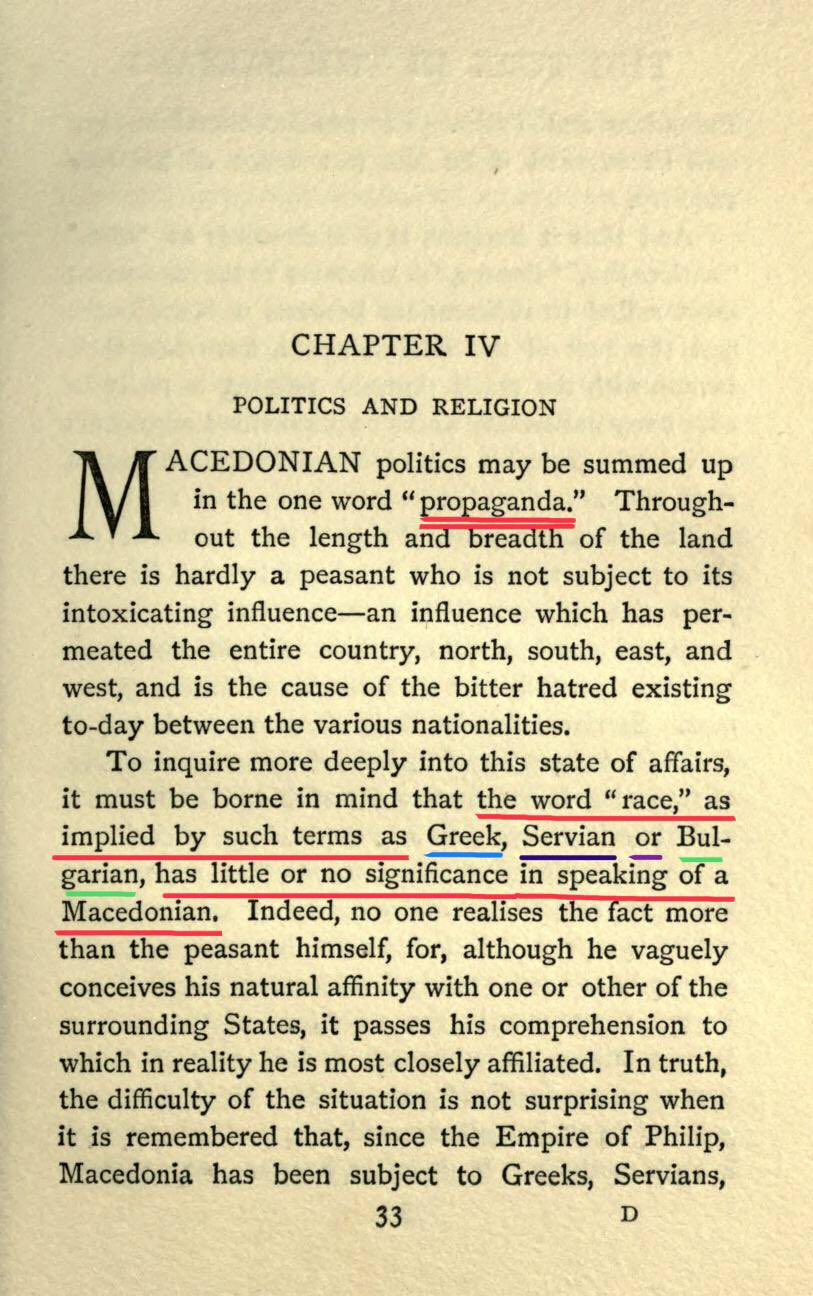
„… Македонската политика може да се собере во еден збор „пропаганда“. По целата должина и широчина на земјата, нема селанец кој не е предмет на пропагандно влијание – влијание кое ја пронижува целата земја, север, југ, исток и запад и е причина за горчлива омраза помеѓу разни националности кои денес постојат.
Да се испита подлабоко во состојбата на нештата, мора да се има на ум дека зборот „раса“, како што имплицираат термините како Грк, Србин или Бугарин нема многу значење кога се зборува за Македонец. …“

CHAPTER IV
POLITICS AND RELIGION
MACEDONIAN politics may be summed up in the one word “propaganda.” Throughout the length and breadth of the land there is hardly a peasant who is not subject to its intoxicating influence—an influence which has permeated the entire country, north, south, east, and west, and is the cause of the bitter hatred existing to-day between the various nationalities.
To inquire more deeply into this state of affairs, it must be borne in mind that the word “race,” as implied by such terms as Greek, Servian or Bulgarian, has little or no significance in speaking of a Macedonian. Indeed, no one realises the fact more than the peasant himself, for, although he vaguely conceives his natural affinity with one or other of the surrounding States, it passes his comprehension to which in reality he is most closely affiliated. In truth, the difficulty of the situation is not surprising when it is remembered that, since the Empire of Philip, Macedonia has been subject to Greeks, Servians,
33 D
THE TURK IN THE BALKANS
Bulgarians and Turks. The peasant, therefore, may well be excused if he has lost count of his true ancestry.
And thus it happens that such words as “race,” “nationality,” “lineage,” or whatever be the expression most suited to differentiate between a Macedonian and the rest of the Balkan world, have lost their savour, with the result that the peasant is ready to adopt any nationality as his own, provided arguments sufficiently plausible are advanced in the process of conversion.
But there is a political side to this extraordinary phenomenon, which is not less bewildering. Of late years the different Balkan races have conceived a “national idea,” or rather, a host of politicians have inspired their followers with dreams of former greatness. Servians, Greeks, Bulgarians are reminded of the extended empire of their forefathers, the necessity of returning to the same order of things is advanced, and Macedonia is claimed as the heritage of each.
In the ordinary course of events these aspirations would be best furthered by means of agitation and public meetings. Such methods, however, are, and always have been, strictly forbidden by the Sublime Porte. Consequently the ambitions of the various Balkan States are advanced, under cover of “missionary enterprises” or “propagandas,” which, although political in their ends, are religious’ and educational in their methods. It therefore happens that, to-day,
34

